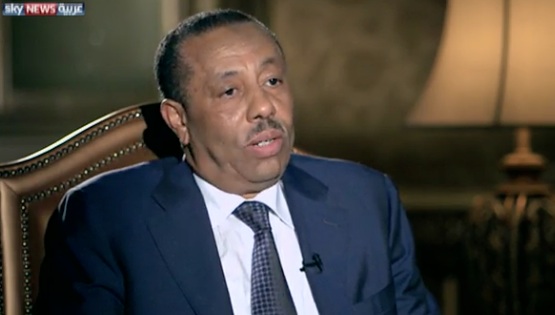By Libya Herald staff.

Benghazi, 14 September 2014:
The Prime Minister Abdullah Al-Thinni has ruled out any negotiations with Libya Dawn accusing it . . .[restrict]of murder, theft and destruction. In an interview with Sky News Arabia TV, he said it was linked to the Muslim Brotherhood which represented no more than five percent of the Libya people.
He also accused Sudan and Qatar of backing it and warned that they did not stop, diplomatic relations would be cut.
Moreover, he disclosed, there were plans “to take out the armed formations in Tripoli within two weeks” and he called on the capital’s residents to stand up to the armed militias and “get them out of the city”.
In a forthright denunciation of the Islamists, he said they had lost the elections to the House of Representatives and so had resorted to violence and deception in their bid for power.
Calling them terrorists who had been involved in “the theft and burning of homes, looting and threatening people’s lives”, he declared there would be no dealing with them. “We do not negotiate with terrorists. We have to defend the Libyan people’s choice.” Dialogue would take place solely with those who recognised the legitimacy of the HoR.
The aim of the Libya Dawn was to control Libya and turn it into a Muslim Brotherhood state, he claimed. It imagined it could do it with the help of Qatar and Turkey, he said. But those two countries had been told not to interfere in Libya.
Only when the militias were taken out of the situation would Libyan citizens live a decent life, he said.
For the moment, though, “we do not have the ability to collect weapons”, he explained. He stressed the importance of the Air Force in targeting munitions stores belonging to the militants.
The next government, he also revealed, would be one of national unity. It would represent all political movements and all parts of the country.
As for the rump Congress in Tripoli, “it is illegal”, he insisted. It and Libya Dawn controlled less than a third of the country, but by force.
When Congress had been operating, he stated, it had fallen into the hands of the Muslim Brotherhood who had deliberately set out to prevent the rebuilding of the armed forces and instead were intent on building up the Brotherhood’s own military support.
The army’s own leadership, too, had been “hijacked” by the Brotherhood, he said, with the result that senior offers had given up while others had been targeted by assassins.
Equating some of the Islamists in Benghazi with the Nigerian terror group Boko Haram as well as claiming that supporters of Al-Qaeda were fighting alongside extremists in the country, he added that the lawful Libyan authorities were looking for help from the international community to smash terrorism in Libya.
That help would be forthcoming, he predicted.
So too would help from neighbouring states. Among them he heaped fulsome praise on Tunisia for its help and support to ordinary Libyans who had fled there because of the events in Tripoli. He also thanked the leader of Tunisian Muslim Brotherhood’s more moderate Ennahda party, Rachid Ghannouchi, who, he said, sought “to reunite the Libyan people”.
Sudan, however, was singled out for particular criticism. He accused it of supporting Libya Dawn and the other Islamist extremists. It had tried to send arms, he said, warning there would be consequences.
His government had already expelled its military attaché, he said. If it persisted with its present policy, “we will break off [diplomatic] relations”.
In the case of Qatar, he said it had succeeded in sending arms to Libya Dawn. Relations with it could be cut too if it did not stop. [/restrict]







